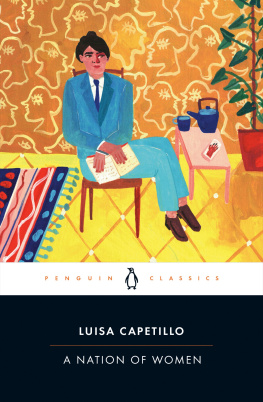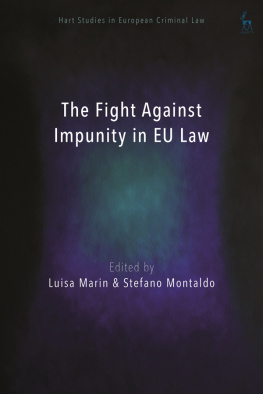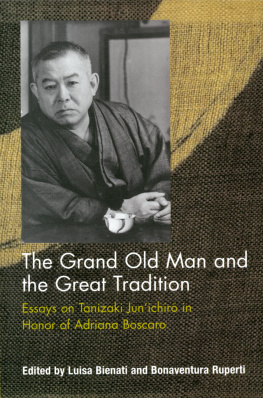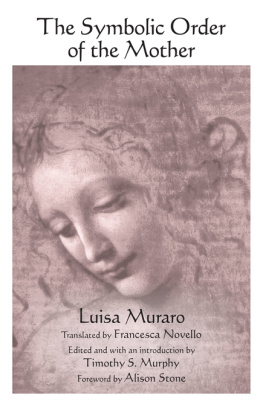First published in 2007 by
Berghahn Books
www.berghahnbooks.com
2007, 2010 Luisa Passerini, Dawn Lyon, Enrica Capussotti and
Ioanna Laliotou
First paperback edition published in 2010
First ebook edition published in 2012
All rights reserved. Except for the quotation of short passages for the purposes of criticism and review, no part of this book may be reproduced in any form or by any means, electronic or mechanical, including photocopying, recording, or any information storage and retrieval system now known or to be invented, without written permission of the publisher.
Library of Congress Cataloging-in-Publication Data
Women migrants from East to West : gender, mobility, and belonging in contemporary Europe / edited by Luisa Passerini[et al.].
p. cm.
Includes bibliographical references and index.
ISBN 978-1-84545-277-3 (hbk) -- ISBN 978-1-84545-278-0 (pbk) -- ISBN 978-0-85745-366-2 (ebk)
1. Women immigrants--Europe--Social conditions. 2. East Europeans--Europe, Western--Social conditions. 3. Europe--Emigration and immigration. 4. Europe--Social conditions. I. Passerini, Luisa.
JV6347.W67 2007
305.48'96902094--dc22
2007012585
British Library Cataloguing in Publication Data
A catalogue record for this book is available from the British Library
ISBN 978-1-84545-277-3 hardback
ISBN 978-1-84545-278-0 paperback
ISBN 978-0-85745-366-2 ebook
Acknowledgements
This book and the project from which it arises are the results of interdisciplinary and inter-national collaboration. The group of scholars who worked together are from seven countriesBulgaria, Denmark, Greece, Hungary, Italy, the Netherlands and the UKand from six disciplinary fieldshistory, philosophy, sociology, law, literature, and women's studies. We have all worked in languages other than our native tongue and have spent time in unfamiliar places for our research work and meetings. The process of the research has been very rich indeed, challenging, unsettling, and the sort of experience that takes you in new directions. Many thanks to all our collaborators in this research. Whilst almost all have chapters in this volume, we must add a special word of thanks to Borbla Juhsz for her contribution in the fieldwork for this study.
In addition, the project engaged many transcribers and translators whose labours on the tape-recorded interviews transformed them into written texts in English so that we might have a common corpus of material. The Bulgarian interviews were transcribed and translated by Lora Boyadzhieva, Galina Chekurova, Nadejda Radulova, and Elena Stoyanova; the Hungarian interviews were transcribed by Ildiko Varga and translated by gnes Mernyi, Nra Kovcs and Pter Vall, and additional work on the transcripts was conducted by Eszter Varsa; the Italian interviews were transcribed by Veronica Pellegrini and translated by Jacqueline Gordon; the Dutch interviews were transcribed by Marlies Drenth, Ruby van Leijenhorst, and Renate Schenk, and translated by Sonja Willems and Benoit Lhoest. In addition, many thanks must go to Giuseppe Lauricella, who took care of the construction of the on-line archive of the interviews; and to Aidan O'Malley for his excellent work in the language correction of this entire book.
The proposal for the research funding which made this project possible was originally suggested to us by the then director of the Robert Schuman Centre for Advanced Studies at the European University Institute in Florence, Yves Mny, now President of the EUI. We are grateful to him and to his successor at the RSC, Helen Wallace, for their support throughout the research. The research was done while the Gender Studies Programme at the EUI was directed by Luisa Passerini and coordinated by Dawn Lyon; since its directorship and coordination too were based at the EUI, it also owes a great deal to the administrative and scientific support of the EUI personnel. In particular we owe much thanks to Roberto Nocentini, and Serena Scarselli for their financial management of the research. We also want to thank all the administrative and academic staff in the different partner institutions for their support with financial and organizational matters, especially Judit Gazsi and Antal rkny.
The research funding was made available to us under the European Commission's Fifth Framework Programme Improving Human Potential and the Socio-Economic Knowledge Base' (contract number: HPSE-CT2001-00087). We gratefully acknowledge the support of the European Commission for this work, and especially thank Virginia Vitorino, our scientific officer, for her encouragement.
In the final stages of this work, we held three events to which we invited colleagues to critically comment upon our work in progress. The first, a conference hosted by the University of Sofia in March 2004, provided the setting for very productive exchanges. In particular we would like to thank our discussants: Anne-Marie Fortier, Eleonore Kofman and Helma Lutz, as well as all the participants of the panel discussion. The second event was a workshop hosted by the EUI in May 2004 where commentators once again helped us to move forward in our interpretations; as did our discussants at a third event, a conference hosted by the CIRSDe and the University of Turin in June 2005. We thank Jean-Pierre Cassarino, Frank Duvell, Mark Bell, Enrica Rigo, Ruba Salih, Bo Strath, and Giovanna Zincone. In addition, earlier versions of the chapters in this book presented as conference papers were greatly improved through the comments of discussants and participants, for which we are very grateful, notably to Jacqueline Andall.
We would also like to thank Marion Berghahn at Berghahn Books for her support for our work. In the preparation of this manuscript, we benefited from the professionalism of our publishers, in particular, Mark Stanton, to whom we are very grateful.
Finally, the greatest debt of gratitude goes to all the women who agreed to be interviewed for this research. The life stories and accounts of 110 women are the basis for this book. We thank them warmly for generously agreeing to share their time, thoughts and experiences with us.
Luisa Passerini, Dawn Lyon, Enrica Capussotti and Ioanna Laliotou October 2006
Editors' Introduction
Luisa Passerini, Dawn Lyon, Enrica Capussotti
and Ioanna Laliotou
Gender, Mobility and Belonging in Europe
This book is about women who move across Europe, specifically women moving from the European CentreEast to the West. Just fifteen years ago, before the fall of the Berlin wall, and the transformation of the Eastern bloc, mobility in eastern and central Europe beyond national frontiers was rare, requiring either political authorization or considerable risk. In present day Europe, migration from the East to the West is a very significant trend in international patterns of mobility. And, in a parallel change to the character of migration in the recent past, many contemporary migrants are women.
The research this book presents is an oral history of women who have migrated from Bulgaria or Hungary, to Italy or the Netherlands. Our aim is to identify new forms of subjectivity that are part of the contemporary history of Europe, and to explore how the movement of people across Europe is changing the cultural and social landscape with implications for how we think about what Europe means. The research assumes migrants to be active subjects, creating possibilities and taking decisions in their own lives, as well as being subject to legal and political regulation amongst others. We ask: How do people make sense of their experiences of migration? Can we trace new or different forms of subjectivity through present day mobility within Europe? What is the spectrum of contemporary forms of identification in Europe in relation to mobility? These latter questions are also relevant to native1 women. Through interviews with native women in Italy and the Netherlands, we document and analyse the points of connection of friendship and empathy between native and migrant women, as well as mechanisms of exclusion and xenophobia expressed by native women, for what these allow us to perceive about the symbolic boundaries of Europe. In short, the contribution of this book is to explore migration for what sorts of subjectivity contemporary forms of mobility induce, in both migrants themselves and in native women, and to reconsider the complex set of representations and perceptions attributed to migrants and migration.









